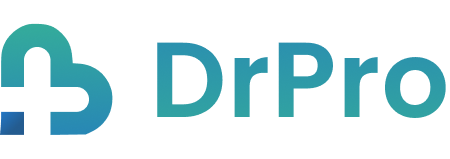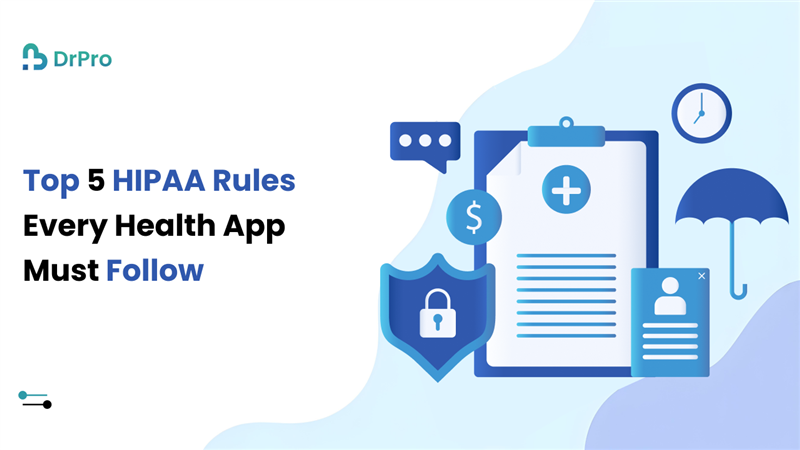People generally like to track and monitor their health using mHealth apps. These apps manage health data for users, set up appointments with doctors, and provide access to lab reports. But big power is big responsibility. A health app can not exercise these liberties to the detriment of end-user privacy.
Historically, one of the most important privacy regulations for the healthcare industry is HIPAA: The Health Insurance Portability and Accountability Act. The act, right there in the United States of America, safeguards the privacy and security of patient health information. The app must comply with HIPAA if it stores and shares health information.
Here are the 5 most important HIPAA compliance rules every health app should uphold to ensure user data security and privacy.
1. HIPAA Privacy Rule
The Privacy Rule prescribes the standards to be followed to protect an individual’s medical records along with other personal health information. It applies to health plans, health care providers, and any business or app transacting in health information.
What the app must do:
- Ensure that users are aware of how their data may be used or shared.
- Provide them with a short, concise, and easy-to-understand explanation of the privacy policies.
- Collect only necessary data. Do not collect extraneous personal information.
- Allow users to review their health data.
If a user says to an app, “Show me what health information you’re storing or sharing,” then the app shall do so. Health apps like DrPro do follow the HIPAA Privacy Rule and thereby allow users full control of their health records.
2. HIPAA Security Rule
The Security Rule of HIPAA technically safeguards health data in storage or transmission in the digital realm. Much focus is laid on health apps storing user data consisting of prescriptions, test results, or doctor notes.
What the app must do:
- Making use of strong passwords and two-factor login.
- Encrypting all health-related data when stored or being transmitted.
- Preventing cyber attacks, including data malware, criminal hacking, and data leaks.
- Providing training for team members about data security.
If the user uploads a prescription, it is stored on an encrypted server. Only authorized persons, such as doctors or pharmacists, should have the ability to access it.
3. HIPAA Breach Notification Rule
Some data breach incidents could occur, despite a health app’s best efforts to keep data safe. This rule mandates that whenever a health app or business has its users’ confidential health data compromised or stolen, it must disclose the breach to those users.
What the app must do:
- Notify the affected users as soon as possible once a confirmed breach happens.
- Report the breach to the U.S. Department of Health and Human Services (HHS).
- If the breach involves over 500 affected persons, then notify the media.\
- Keep a written record of all information concerning the breach and measures taken to resolve the breach.
Being transparent is a good thing. Concealing breaches is strictly prohibited by the Health Care Professional and Digital Platform HIPAA codes.
📲 Follow us on Facebook, Instagram, Twitter, App Store, IOS Store, LinkedIn & YouTube for more wellness tips!
4. HIPAA Minimum Necessary Rule
The idea here is that the app should use or share the least amount of data necessary for its purpose. The more data that is exposed, the higher the chance of someone getting hurt in case of a mistake or breach.
What the app must do:
- Only allow access to health data necessary to carry out a task.
- Avoid sharing full medical history if only one piece of information suffices.
- Limit what an employee or user can see within the app.
A concrete example here is when a person books a lab test through the app. The lab needs only basic contact information and details of the test order, not a complete health history of the user.
5. HIPAA Business Associate Agreement (BAA)
If the app works with labs, pharmacies, cloud storage, or payment processors, these are called business associates. Business associates must also comply with HIPAA rules.
What the app must do:
- Be sure to enter a BAA with every partner.
- Make sure every partner understands and complies with HIPAA regulations.
- Avoid engaging vendors that are non-compliant.
Failure to ensure the above may mean lawsuits and heavy fines for offending apps. A BAA will declare what data is shared and how it will be protected.
Why Following HIPAA Matters for Health Apps
A few reasons why health apps must take great care to adhere to these rules:
1. Trust of User
Users use the app more if they believe their data is secure and private.
2. Lawfulness
Any breach of HIPAA may result in heavy fines, lawsuits, or banishment from the market.
3. Enhanced Data Maintenance
HIPAA provides guidelines that enable health apps to administer data in an ordered and secure environment.
4. Safe Healthcare
Healthcare professionals can provide better treatment if their patient information is truly secure and accurate.
How DrPro Ensures HIPAA Compliance
DrPro, a trusted name in health apps, follows all the major HIPAA regulations to keep the user safe. DrPro uses secure servers, encrypts data storage, and conducts periodic audits. It also signs BAAs with its partners and provides users with full control of their health records.
Being compliant helps DrPro foster a relationship of trust not only with the users but also with healthcare professionals.
Conclusion
Health apps are transforming access to healthcare, but it is important to keep privacy and security alongside convenience. Compliance with HIPAA regulations such as the Privacy Rule, the Security Rule, and the Minimum Necessary Rule assures health apps are protecting user information and helps avoid lawsuits.
While planning or working on a health app, ensure these five rules are in place. Patients deserve apps that work AND respect their privacy.
FAQs
Q1. What exactly is HIPAA compliance?
HIPAA compliance means following regulations to protect personal health information against misuse or unauthorized disclosure.
Q2. Does every health app have to comply with HIPAA?
Not every app, but if any app is sharing or storing the personal health data of a patient with a hospital, lab, or insurance provider, it has to comply with HIPAA.
Q3. What happens if a health app does not follow HIPAA rules?
The app may face legal actions, penalties, or be banned from certain platforms.
Q4. How can users check if a health app is HIPAA compliant?
Users should check the app’s privacy policy or ask the support team about HIPAA practices.
Q5. Is my data safe on apps like DrPro?
Yes, apps like DrPro are HIPAA compliant and use strong security methods to keep your health data private and safe.


